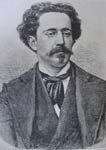8.5.3 Gaspar Villate

Gaspar Villate, Cuban composer, was born on January 27, 1851, in Havana. He was a disciple of Nicolás Espadero. He composed the opera “Angelo, Tyrant of Padua” based on Victor Hugo’s play of the same name when he was just sixteen years old.
Gaspar emigrated to the United States in 1868, at the outbreak of the American Revolution. He returned to his homeland in 1871, after the peace treaty was signed, and it was during this period that he wrote the opera “The First Arms of Richelieu.”
Some time later, he went to Paris, where he studied with Bazin, Joncietes, and Danrihauset, and exhibited several of his works. He was a friend of Giuseppe Verdi.
He premiered some of his works on major stages, such as the Teatro Real in Madrid, a composition based on “Baltasar” by Gertrudis Gómez de Avellaneda, and his opera “Zilia” at the Theatre Italien in Paris. He also premiered La Czarine (The Hague, 1880) and Baldassare (Madrid, 1885). During Villate’s lifetime, only “Zilia” was exhibited in Havana; the rest were shown in Cuba during the 20th century.
His theatrical output lacks many Cuban influences, with the exception of his pieces, which are considered the most accomplished in his repertoire: “La virgen tropical,” “Adiós a Cuba,” and “Contradanzas.” His music, in general, is characterized by its lack of or lack of Creole inspiration, which correlates with the Italian style of Verdi’s second period.
His operas were influenced by his Italian and French contemporaries, including Zilia (1877), La tsarina (1879), and Balthazar (1875). His work as a composer also includes eight waltzes, some “Soirées Cubanines,” and several romances.
Upon his death in Paris in 1891, Villate bequeathed all his music to the Library of the Economic Society of Friends of the Country, and from there it went on to expand the collections of the National Museum of Music, where they are still preserved today. Gaspar Villate is considered the most successful Cuban opera composer of the 19th century.








